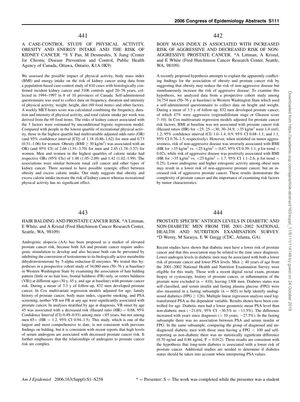Prostate Specific Antigen Levels in Diabetic and Non-Diabetic Men from the 2001–2002 National Health and Nutrition Examination Survey
June 2006
in “
American Journal of Epidemiology
”

TLDR Long-term diabetes is linked to lower prostate cancer risk.
The document presents findings from several studies on factors associated with prostate cancer risk. One study involving 34,060 men found no significant association between hair balding patterns and prostate cancer risk overall, but vertex baldness onset by age 45 was linked to a decreased risk in men under 65. Another study with 34,754 men suggested that obesity might increase the risk of aggressive prostate cancer while decreasing the risk of non-aggressive prostate cancer. A third study from the 2001-2002 National Health and Nutrition Examination Survey, which included 1,308 men, reported that diabetic men had lower prostate-specific antigen (PSA) levels than non-diabetic men, especially with longer duration since diabetes diagnosis, supporting the hypothesis that long-term diabetes is associated with a lower risk of prostate cancer. These studies highlight the complexity of prostate cancer risk factors and suggest that factors like obesity and diabetes may have different effects on the risk of aggressive versus non-aggressive prostate cancer.